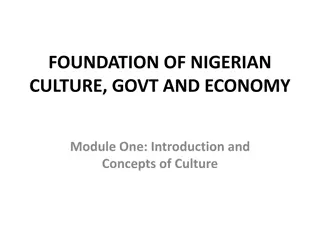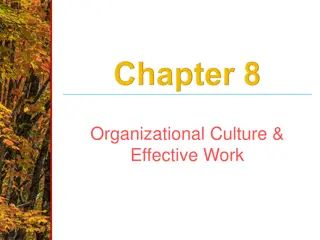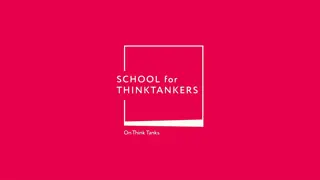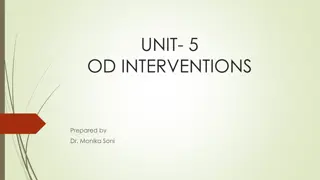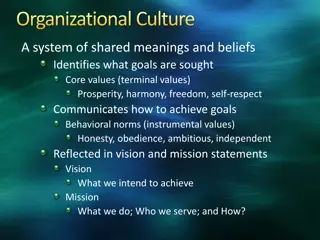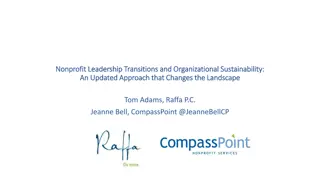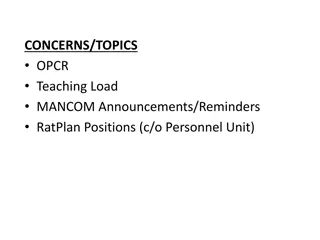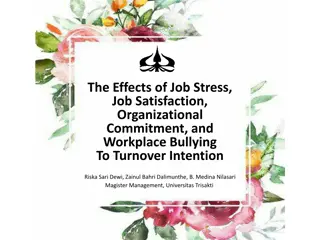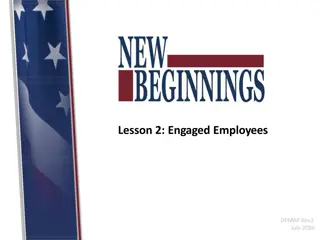Exploring Personal Performance and Organizational Culture
Delve into the relationship between personal performance and organizational culture, understanding how values, behaviors, and habits shape the work environment. Discover how individual contributions impact company success, navigate generational differences, and foster a culture of inclusivity. Learn how organizational culture influences decision-making, policies, and overall mood within a diverse workplace setting.
- Organizational Culture
- Personal Performance
- Workplace Dynamics
- Generational Differences
- Company Success
Download Presentation

Please find below an Image/Link to download the presentation.
The content on the website is provided AS IS for your information and personal use only. It may not be sold, licensed, or shared on other websites without obtaining consent from the author. Download presentation by click this link. If you encounter any issues during the download, it is possible that the publisher has removed the file from their server.
E N D
Presentation Transcript
Objectives Understand the links between personal performance and organizational culture Identify organizational characteristics that add value to your work Identify how your individual work contributes to the growth and success of the company Learn to contribute to an environment that includes, accepts and enables different cultures and generations, allowing them to work together Learn to respect generational differences related to the use of technology in the workplace Understand the link between communication skills and synergy Addresses Arizona Employability Skill Standards Organizational Culture and Intergenerational and Cross-Cultural Competence
Personal Performance & Organizational Culture What is culture? It s the values, vision, symbols, behavior, and habits that a group of people share So organizational culture is: The values, vision, symbols, behavior, and habits that a specific group of people within an organization share Key word: organized
Personal Performance & Organizational Culture Organizational culture determines policies, procedures, reporting, decision-making, responsibility and rewards And organizations are made up of many different people Different cultures Different generations
Personal Performance & Organizational Culture The culture of the organization sets the tone for everyone Establishes the way activities will occur, especially the overall mood of those involved Those who are higher up have more responsibility for deciding those policies and procedures This is often earned after gaining much experience BUT different cultures and generations see and experience things differently!
Personal Performance & Organizational Culture Regardless of your position within the organization, YOU and your work play an integral part in the success of the organization Your work helps the company grow, and this is true for every team member at every level EVERYONE is a contributor How can you contribute?
Personal Performance & Organizational Culture YOU can contribute to the success of the company in 3 key ways: 1. Understanding the links between you and the organizational structure 2. Identifying characteristics that add value to your work 3. Identifying how your work contributes to the success of the company
Personal Performance & Organizational Culture Understanding the links between you and the organizational structure Remember, companies are organized for a reason Failure to follow the organization may result in those who should be involved getting left out Likewise, getting those who do not need to be involved can be an avoidable waste of time and money So it is critical that you learn who is responsible for: Policies & procedures Rewards & compensation Technology & use of technology
Personal Performance & Organizational Culture Understanding the links between you and the organizational structure Once you know who is responsible, and what they re responsible for You have to also learn the extent of their authority i.e. What kinds of decisions are they authorized to make?
Personal Performance & Organizational Culture Understanding the links between you and the organizational structure Would you ask the cleaning crew to decide if it s okay to use your cell phone while on the job? Tempting, but NO They re not authorized to make such a high-level decision They may, however, have the authority to decide the best way to clean a spilled chemical, such as paint That authority being granted through training and experience
Personal Performance & Organizational Culture Understanding the links between you and the organizational structure Would you ask the cleaning crew to decide if it s okay to use your cell phone while on the job? Human Resources is likely the best place to ask because they are routinely authorized to make decisions that affect everyone
Personal Performance & Organizational Culture So how does this help YOU to get ahead? Your company is in business to make money Anything YOU do that helps achieve that goal makes the company stronger and gets YOU more experience And the more experience you have, the more valuable you become Which results in you getting more to do (more responsibility) and more reward (higher pay) And eventually YOU get to make the decisions and policies! YOU set the tone!
Adding Value to Your Work Aside from gaining experience and becoming valuable to the company, what can YOU do to add more value to your everyday work?
Adding Value to Your Work 3 key things you can do, starting NOW 1. Understand the evolution of the company Those who don t know history are doomed to repeat it Edmund Burke Learn from history, or you re doomed to repeat it Jesse Ventura We need to know how we got here, and why!
Adding Value to Your Work 3 key things you can do, starting NOW 2. Practice the values and styles of working and communication that reflect the culture of the organization Nobody is an employee. We re all associates. Bank of America Notice the slight difference? Employees show up. Associates work together. The customer is always right. The customer chooses where to go. Without them, we don t have a job. Everyone is a customer Customers and those who aren t, may be turned off by your poor representation of the company
Adding Value to Your Work 3 key things you can do, starting NOW 3. Read books and documents your supervisors read Remember #1 about history? If you know where your supervisor is coming from (their background), you ll be better able to anticipate what they ll want PLUS it puts you on the same page as them You ll be in the loop! Makes YOU more valuable because YOU make their life easier!
Individual Contributions & Organizational Success Now we know who does what, and how to add value to what we do What things can we do to directly advance organizational growth and success? These are business strategies that will not only help the company, but will also help you to be more valuable!
Individual Contributions & Organizational Success What things can we do to directly advance organizational growth and success? YOU are empowered to use your mind and experiences! Look for ways to help, particularly in quality and organizational advantage Quality produce work that meets quality standards Take pride and ownership in what you do You are the first line of defense against poor quality, and poor quality affects the entire company!
Individual Contributions & Organizational Success What things can we do to directly advance organizational growth and success? YOU are empowered to use your mind and experiences! Look for ways to help, particularly in quality and organizational advantage Organizational advantage scope out the competition Once you know what they re doing, figure out how YOU can do your job better Improve workflow processes Talk with potential customers about the great things you re doing Your competition won t give you an edge YOU have to make it
Cultural Differences Your job is to make the organization/company successful You can t do it alone, so it takes others working together toward this common goal We re all different! Organizational culture sets the tone So many different people are all working toward the same common goal!
Cultural Differences Everyone counts because we all contribute But everyone s contribution is different And we have to accept and understand that because it can give us an advantage over the organization s competition In the workplace, there are two key sources of these differences: Cultural Generational
Cultural Differences Culture - The values, vision, symbols, behavior, and habits that a group of people share Cultural differences arise when people have different values, vision, symbols, behavior and habits This is not a bad thing! Different viewpoints provide different perspectives and more ideas
Cultural Differences YOUR role is to help the organization succeed Integrity requires that you put forth effort to get along with your co-workers One of the easiest ways to do this is to learn about their cultures, then communicate with them in a manner that is inclusive, accepting and enabling of those cultures
Cultural Differences Specific cultural differences to consider Language Not just ability to speak and understand the language, but mastery of jargon too The boss was off the hook in that meeting today Great job! You KILLED it! I heard it from the horse s mouth! www.canstockphoto.com Saraegoodman.blogspot.com tri.be/go-to-the-dentist
Cultural and Generational Differences Specific cultural differences to consider Body language Showing the bottom of your shoe Offensive to Arab culture Giving a business card with one hand Offensive to Chinese culture Communication styles Most senior person at a meeting speaks first Chinese culture Perfect manners (please and thank you) for business, but NOT personal life Indian culture
Cultural Differences Specific cultural differences to consider Gender views Men shaking hands with a woman Offensive to Indian culture Men shaking hands with a woman NOT an issue in Chinese or American culture Value for time Monochronic cultures Time is a commodity not to be wasted United States, Northern Europe, China Polychronic cultures The day takes as long as events need to Southern Europe, Latin America, Caribbean, Middle East
Cultural Differences Specific cultural differences to consider Handling disagreement Shout and try to talk over the other Italian & Turkish cultures Quiet discussion without ever losing temper Chinese culture Agree to disagree English culture
Cultural Differences Understanding someone s culture helps you get past simple issues and see what can be added to the conversation This puts others at ease, encouraging honesty and openness Which creates an environment that is inclusive, accepting and enabling of different cultures, allowing everyone to work together Which benefits EVERYONE!
Generational Differences Generational differences differences related to age A typical workplace can have up to four different generations(1) of people working together! Traditional generation a.k.a. The Greatest Generation Baby Boomers Generation X Generation Y a.k.a Millenials Which means potential for lots of differences!
Generational Differences Specific generational differences to consider(1) Stereotypical work attitudes Work hard Traditional generation Workaholic Baby Boomers Work only as hard as needed Gen. X Not committed to work - Millenials Not necessarily true Much depends on education level, full- or part-time, family income level, and marital status
Generational Differences Specific generational differences to consider(1) Loyalty to employer Traditional and Baby Boomers tend to be extremely loyal They seek stability Gen. X and Millenials don t see loyalty related to keeping their job BUT Gen. X and Millenials are highly loyal if the organization s values are in line with their values
Generational Differences Specific generational differences to consider(1) Personal respect and authority What is respect? Respect is the understanding that someone or something is important and should be treated that way! Remember EVERYONE contributes as part of the team The simple fact that they are a member of the team means they deserve at least respect for that
Generational Differences Specific generational differences to consider(1) Personal respect and authority Regarding authority, all generations have respect for authority, BUT Traditionals value chain of command Gen. X and Millenials are not impressed or intimidated by different levels and titles Gen. X and Millenials want to know that their ideas and suggestions are heard Traditionals and Baby Boomers think employees need to work their way up This is a common issue that can easily cause friction between generations!
Generational Differences Specific generational differences to consider(1) Attitudes toward supervision Younger workers strongly dislike micromanagement but want specific instructions and clear expectations for tasks Younger workers prefer regular feedback Older workers tend to be offended by it
Generational Differences Specific generational differences to consider(1) Work/Life balance Gen. X is the only group that actively seeks a balance between work and life Traditional and Baby Boomers are more likely to sacrifice family time for work Millenials expect that work will accommodate their outside life
Generational Differences Specific generational differences to consider(1) Training Big differences here! All see technical and social skills as crucial for job success But how those skills should be obtained is very different Traditional and Baby Boomers desire technical training, while Gen. X and Millenials prefer to learn it on their own (on the job)
Generational Differences Specific generational differences to consider(1) Technical Big differences here! Training preferences explain a lot of this Younger people tend to figure it out , older people read the manual Think of your parents or grandparents and technology Cellphones Computers Skype Who do they call when they need an expert? How did YOU learn to use these? How did THEY learn to use them?
Generational Differences Specific generational differences to consider(1) But what about the social part of technology? Is it okay to take a call on your cell phone when at work? Is it okay to surf the net while writing a report at work? What about using a company computer at home over the weekend, to search for vacation sites? Clearly, there are generational differences regarding technology and work too!
Generational Differences Specific generational differences to consider(1) In the end, however All four generations tend to have the same personal goals and expectations Stability Work and personal life No wasted time (do something else when the task is complete) Desire for fairness, recognition, expressed value, variety of projects High pay Friendly, team-environment
Communication and Synergy So we ve identified that cultural and generational differences are present in the workplace How do we address these differences? We rely on integrity to do the right thing, then communicate to create synergy Synergy Increased effectiveness resulting from groups of people working together(2)
Communication and Synergy When communicating, we have to take into account organizational culture, as well as cultural and generational differences This creates an atmosphere that is inclusive, accepting and enabling, which leads to greater success (synergy) for the organization And organizational success leads to personal success and reward!
References 1. Tolbize, A. (2008). Generational differences in the workplace. Research and Training Center on Community Living, 1-21. Merriam-Webster. (2014). Synergy. (Merriam-Webster, Inc.) Retrieved from Merriam-Webster Online: http://www.merriam-webster.com/dictionary/synergy 2.



